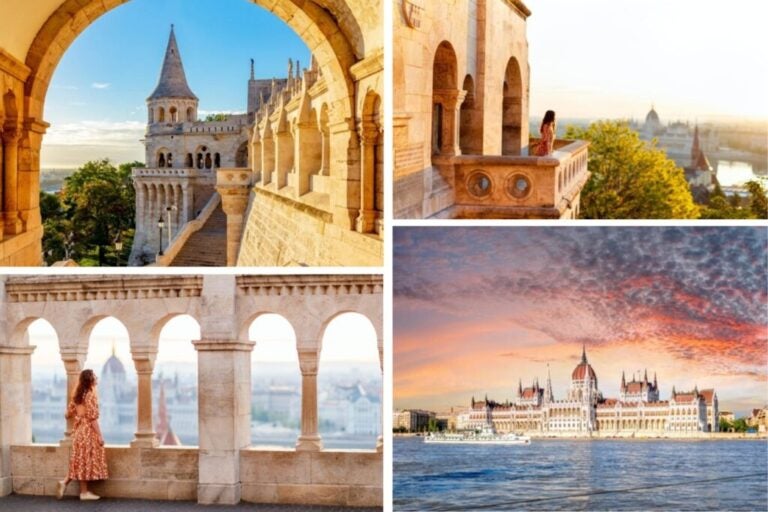Accommodation in Budapest for long-term stays as a digital nomad
This guide to accommodations in Budapest for long-term stays will help you find the best option for your needs.
Budapest is one of Europe’s most beautiful and welcoming capitals, offering affordable accommodation compared with Paris, London, or Barcelona. Therefore, there are many accommodation options in Budapest for long term stays. That’s what we’ll talk about today.
The Hungarian capital offers everything you could need to live comfortably, whether you’re here to work remotely, study, or simply enjoy a change of scenery for a few months. From excellent connectivity to many districts with their own identity, Budapest has it all.
Another great advantage: The wide variety of accommodation designed for long stays. From modern colivings and furnished apartments to student residences and hotels with monthly rates, Budapest lets you settle in quickly, without complex paperwork or spending huge amounts of euros.
So, the first thing you should do is read this complete guide to the best long-stay accommodation and neighbourhoods in Budapest, to find the most suitable option for your plans. Then, just gather the travel documents you’ll need and start living your dream of spending some time in the “Pearl of the Danube.”
Where to stay in Budapest? The best options for a long-term stay
Budapest is one of those cities that enchant you effortlessly and deserve to be discovered slowly. The great Central European river, the Danube, divides it in two: Buda and Pest. Around them stand historic landmarks such as the photogenic Parliament and the Chain Bridge. You’ll also find thermal baths along the river, cosy cafés, manicured parks, palaces, and viewpoints.
Most people explore all this in three or four days. But imagine living here for a while and truly enjoying everything Budapest has to offer. To do that, you’ll need a comfortable place to live during your stay in the city.
Next, we’ll show you the best options for digital nomads, students, remote workers, and travellers who share their adventures online.
Coliving in Budapest
In recent years, Budapest has become a hub for remote workers from around the world, driving the growth of coliving spaces. These combine accommodation, coworking, and community in environments specially designed for people working online. Alongside private or shared rooms, you’ll enjoy high-speed Wi-Fi, well-equipped shared kitchens, weekly cleaning, and regular community events — all included in the monthly rate.
Therefore, living in a coliving in Budapest is the best option for digital nomads and remote workers who want to make friends and network globally. We especially recommend District VII (Erzsébetváros), a favourite among nomads; District VIII (Józsefváros), which is more affordable; and District XIII (Újlipótváros), peaceful, modern, and close to the Danube.
- Staying in a coliving in Budapest costs between $495–935 (€450–850), depending on room type (private or shared), location, and extra services (breakfast, classes, 24/7 coworking).
Some good examples are KAPTÁR Budapest Coliving, right in the city centre, with direct access to the most popular coworking space in town; CoSpace Budapest, a boutique-style place with a sustainable approach; and The Nest Budapest, known for its creative spaces, including rooms for painting, reading, and idea sharing. You can also find similar options in Facebook groups such as “Budapest Coliving & Coworking,” or on platforms like Coliving.com, Flatio, and Nomadx.
Where to stay in Budapest? Furnished apartments
If you prefer complete independence, renting a furnished apartment by the month is an excellent alternative to coliving. Fortunately, in Budapest, you’ll find everything from practical studios to spacious flats with terraces or river views. Imagine working every day with a view of the Danube! Most include full equipment such as Wi-Fi, heating, and a washing machine.
The cost of furnished apartments in Budapest depends on what you’re looking for:
- Studios: Between $605–880 (€550–800).
- 1-bedroom: Between $660–990 (€750–1,200).
- 2-bedroom flats: From $1,210–1,650 (€1,100–1,500).
Reliable platforms to find this type of accommodation include Spotahome, Flatio (specialised in medium-term rentals), HousingAnywhere (ideal for students or young professionals), and Rentingo (a local option with strong filters). You can also check Facebook groups such as “Budapest Housing, Rooms, Flats, Apartments for Rent,” where private landlords post daily.
A practical tip: When checking listings, look for “rezsi” (utility bills). In winter, heating costs can rise significantly, so it’s worth asking beforehand. For stays longer than 90 days, look for registered contracts, which are useful if you plan to register your address or apply for a residence permit.
Airbnb for seasonal stays
Another quick and convenient way to find where to stay in Budapest is Airbnb, especially if you want to avoid deposits or long contracts. Many local hosts regularly welcome digital nomads, students, and medium-term travellers, so expect monthly discounts of up to 40% through the platform.
- The average monthly price of an Airbnb in Budapest ranges between $715–1,430 (€650–1,300), including services (Wi-Fi, heating, water, electricity, and occasional cleaning).
Airbnb’s advantages are clear: No contracts, many properties with self check-in, and powerful filters by type and amenities. One of the biggest perks is that it lets you try different neighbourhoods before committing to one.
Hotels with long-stay discounts
Budapest welcomes millions of tourists each year, so its hotel offer is extensive. Although mainly aimed at short-term visitors, many hotels and aparthotels provide special monthly rates for guests staying longer than usual (typically over 14 or 28 nights). They’re an excellent option if you want to arrive and not worry about anything: You’ll have reception, cleaning, towels, bedding, a fully equipped kitchen, and often breakfast included.
- The average monthly rate ranges between $935–1,540 (€850–1,400), depending on the hotel category, included services, and location.
Some recommended hotels include Marmara Hotel Budapest, Nova Aparthotel, Adina Apartment, and Six Inn Hotel.
However, not all discounts appear online. It’s best to contact the hotel directly (via email or WhatsApp) and ask for “long stay” or monthly packages. Some even include airport transfers, which can be useful if you arrive with lots of luggage or late at night.
Student and professional residences
Budapest hosts prestigious universities, art schools, Erasmus programmes, and research centres. As a result, it offers a wide range of student residences, from basic options to modern, well-equipped buildings.
- Residences are a more affordable accommodation alternative: $330–660 (€300–600) per month, including Wi-Fi, heating, shared kitchen, basic cleaning, and communal areas.
Student Hotel Budapest, for instance, provides modern rooms with private bathrooms, large communal spaces, and a lively international atmosphere. Also noteworthy are Avalon Residence, near Semmelweis University, and Uninest Student Residences, offering coliving-style accommodation with coworking, gym, and rooftop terrace.
Keep in mind that while many residences accept only students, some also welcome nomads or freelancers under 35. You can often apply as a “remote worker” (they may request proof of income or a work contract). Apply early, especially for the September–December semester.
A tip for having internet in Budapest
The Hungarian capital boasts one of Eastern Europe’s best digital infrastructures. Most accommodations offer fast, stable, and unlimited Wi-Fi. Therefore, you’ll have no trouble working, making video calls, or uploading large files while staying in the city.
However, to stay connected from the very first minute — even at the airport or on the metro — it’s better to arrive prepared, especially if you plan to work from cafés or Budapest’s many green spaces. The eSIM for Hungary from Holafly gives you unlimited data only for the days you need, perfect for short stays.
Important: If you are a frequent traveler and want to stay connected without worrying about expensive roaming or looking for a new SIM at every destination, Holafly’s subscription plans are for you. With a single eSIM, enjoy internet in more than 170 countries for a fixed price and no surprises on your bill. Travel without limits and connect easily and securely! 🚀🌍

Where to stay in Budapest? Neighbourhoods and areas for a long-term stay
As mentioned, the Danube divides Budapest into two halves: Buda, a more residential, green, and peaceful area on a hill; and Pest, urban, lively, and vibrant, spreading across flat ground. This natural split shapes each side’s rhythm: Buda offers tranquillity, while Pest is full of cafés, coworking spaces, and nightlife. Together, they include 23 districts: I, II, III, XI, XII, and XXII in Buda, and the rest in Pest.
The best part is that no matter which district you choose, everything is well connected by metro, tram, or bus. You can move between areas quickly and affordably. Many streets are also ideal for walking or cycling, letting you explore the city at your own pace.
Below, we’ll show you the best districts to stay in Budapest long term. Each has its own style and personality, so you can pick one based on your budget, social activity level, and preferred lifestyle.
District VII (Erzsébetváros): Ideal for digital nomads and students
District VII, also known as Budapest’s Jewish Quarter, is the young, artistic, and multicultural heart of the city. This authentic and lively area blends ruin pubs, alternative galleries, local markets, and cafés with fast Wi-Fi. It’s also the nightlife hub, with an active international community of students and digital nomads.
In your free time, visit landmarks like the Great Synagogue and the Hungarian Jewish Museum. We also recommend Café New York, one of the city’s most iconic spots. Did you know that, in the 19th century, it hosted Austro-Hungarian emperors and nobility? It still preserves its original decoration, with bronze sculptures, wooden furniture, and painted ceilings that take you back in time with every coffee.
Transport connections are excellent: You can walk everywhere or take metro line M2, tram 4/6, or various bus and trolley lines.
Accommodation in District VII
- Recommended colivings: KAPTÁR Coliving, The Nest Budapest, CoSpace Budapest.
- Budget hotels or long-stay discounts: Mango Aparthotel (approx. $39–44 (€35–40) per night for monthly stays, totalling $1,155–1,320 (€1,050–1,200) per month); Barceló Budapest (offers up to 25% off for stays over 21 nights).
- Student residences: Dean’s College Hotel (from $440 (€400) per month), Nova Inn Students’ Residence (from $330 (€300) for shared rooms, or $495 (€450) for private rooms).
Tip: This district has a vibrant nightlife. If noise bothers you, avoid staying directly on Király utca or Gozsdu Udvar. Choose inner streets —they’re quieter yet still central.
District XIII (Újlipótváros)
Újlipótváros is one of Budapest’s best-kept secrets. Although just 10–15 minutes from downtown, it feels completely different: Leafy streets, family bakeries, organic markets, and independent bookshops. Located by the Danube, it’s a residential area mixing 1930s architecture with new buildings along the riverbank.
In your free time, visit Margaret Island (Margitsziget), the city’s large central park. This 2.5 km island is a car-free green oasis, perfect for cycling, running, walking, or reading under the trees. Another highlight is WestEnd City Center, one of Budapest’s biggest shopping malls.
The area connects to the rest of the city via metro line M3, frequent buses, and trams. Nearby Nyugati station provides direct connections to other cities.
Accommodation in District XIII
- Hotels for long stays: Adina Apartment Hotel Boutique (from $1,320–1,540 (€1,200–1,400) per month), Vitta Hotel Superior Budapest (around $44 (€40) per night, with discounts for stays over 15 days, averaging $990–1,100 (€900–1,000) monthly).
- Student residences: BCS Residence – Budapest College of Communication (from $385 (€350) shared, or $550 (€500) private), Corvinus University Dorms – Újlipótváros extension (from $275 (€250)).
- Coliving: Coliving Budapest (from $440 (€400) shared, or $660 (€600) private per month).

Where to stay in Budapest? District VI (Terézváros), one of the city’s most elegant neighbourhoods
Terézváros lies between Parliament and Nyugati train station, making it one of the best areas to stay in Budapest. It combines central convenience with a quieter, more elegant vibe than its lively neighbour, District VII. If you want to live surrounded by art, history, and stylish cafés, this is your place. Did you know this area hosts Hungary’s most important theatres? You’ll also find boutique galleries and cinematic façades everywhere.
The “theatre district” runs along Andrássy Avenue (a UNESCO site), one of Budapest’s grandest streets, stretching to Heroes’ Square. Highlights include the stunning Budapest Opera House and Oktogon Square, a key transport hub linking Buda and Keleti station.
For transport, metro line M1 (Europe’s oldest underground tramway), buses, and trams pass through. You can also walk to most major attractions easily.
Accommodation in District VI
- Coliving: The Spot Budapest (from $605 (€550)/month), Flatmates Budapest – Coliving & Rooms (from $440 (€400)/month).
- Student residences: HomePlus Students’ Residence (from $385 (€350) shared, or $550 (€500) private); K6 Residence – Semmelweis University extension (from $495 (€450)/month).
- Hotels with long-stay discounts: Revay Hotel (from $71.50 (€65)/night, discounted to about $1,430 (€1,300)/month), Opera Garden Hotel & Apartments (from $1,320 (€1,200)/month).
- Furnished apartments: Wide choice in classic buildings with wooden floors, stained glass, and balconies. Prices range from $935–1,430 (€850–1,300) per month.
District I (Várkerület): One of the most beautiful areas to stay in Budapest
Want to stay in historic Buda? The Castle District and Danube views make District I the city’s soul. This hilltop area is home to Buda Castle, Fisherman’s Bastion, and Matthias Church. It’s touristic yet also residential and very safe. At night, the streets are calm and peaceful.
Many apartments occupy restored century-old buildings, offering stunning views and a unique feeling of living inside a postcard.
Transport links are excellent: Metro line M2, mountain buses (like 16), a funicular, and several walking paths. Everything is well connected, though walking is slower due to the terrain. You can easily cross to Pest via the bridge.
Accommodation in District I
- Hotels with long-stay discounts: Maison Bistro & Hotel (from $77 (€70)/night, with discounts for stays over 14 nights, totalling around $1,430 (€1,300)/month), Baltazár Boutique Hotel (from $1,320 (€1,200)/month when booking directly).
- Student residences: MOME Residence for art and design students (from $440–495 (€400–450)/month), Student Stay Castle Hill (from $385 (€350) shared).
- Coliving: The Loft Castle District – Coliving Boutique (from $660–770 (€600–700) private room).

Frequently asked questions about where to stay in Budapest
All the neighbourhoods mentioned are great options to stay in Budapest. However, if you want balance between local life, good connections, peace, and fair prices, the best choice is Újlipótváros (District XIII). This area offers excellent quality of life without losing touch with the real city.
It depends on your nationality and how long you plan to stay. EU and Schengen citizens can live, study, or work in Hungary freely. Latin American citizens can stay up to 90 days as tourists without a visa. For longer stays, you must apply for a temporary residence permit for study, work, or digital nomad purposes.
Absolutely! Budapest is very safe, even for walking alone at night. The crime rate is very low compared with other European capitals. Still, stay alert in the most touristic areas, as pickpockets can occasionally be around—just like in any big city. Still, stay alert in tourist areas where pickpockets may appear, as in any city. For extra peace, Buda districts (I or XII) or Újlipótváros in Pest are great choices.
Spring (April–June) and autumn (September–November) are the best times to enjoy Budapest’s mild weather, fair prices, and fewer tourists. Summer (July–August) is lively with festivals but also hotter and pricier, while winter (December–February) is cold yet magical thanks to its Christmas markets. In short, Budapest is great year-round.
Yes, Budapest is among Europe’s most affordable capitals. You can rent a room or coliving from $440 (€400) per month. A daily menu at local restaurants costs around $5.50–8.80 (€5–8). Plus, there are many free cultural events, resident discounts at thermal baths, and student benefits.





 Language
Language 


















 No results found
No results found







